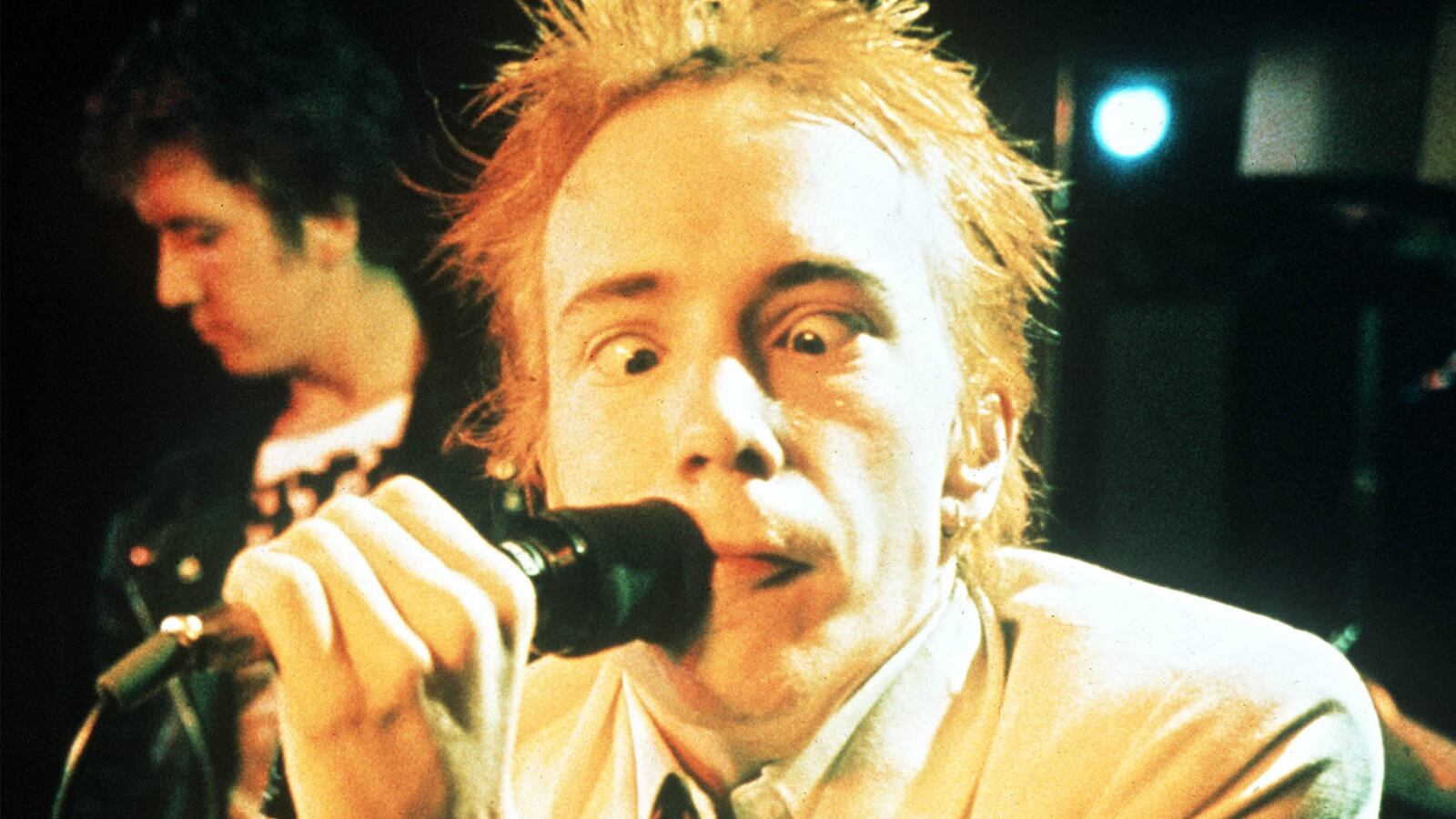We all know, or think we know, what Johnny Rotten hates.
He’s the Antichrist, right?
He hates everything!
Which to me, after the initial explosion of the Sex Pistols, always made Rotten kind of boring.
“Yeah, yeah, everything sucks; the world is full of liars and cheats, you grew up in some shitty London flat, everyone was on the dole, no one understands you—and enough already! Jeez-Louise, we all know anger is a great inspiration for creativity, but isn’t there anything worthwhile out there?
I knew Johnny was much funnier, talented, and intelligent than the way he presented himself for most of his career, and I’ve been waiting for him to show his true colors. Well, the wait is over, because in Anger Is an Energy, his new autobiography, Johnny Rotten finally lets us inside his grimy world in this fascinating, intelligent, funny, and well-written memoir full of glorious slang.
It’s truly a delicious read.
Even if I don’t always understand the slang or references, Rotten still hits the bull’s eye making his points. Try this one on for size:
“So I decided to have my hair cropped short and dyed green. Krazy colour was genius. It’s a shame it’s not of the same thickness and durability today as it was then. They’ve somehow watered it down, and the colours aren’t as vibrant. It’s pretty damn near next to useless unless you want to look like a faded newspaper. You know the cartoon segment that used to be in colour in rancid old newspapers? Them kind of colours—that’s all you get out of it now. Or maybe people don’t know how to bleach properly. Back then, the colours were really zingy and thrilling.
“My dad seriously didn’t approve, though, and it was the final straw that got me thrown out of home. Dad’s famous quote was, ‘Get out the house, you look like a Brussels sprout!’ I never forgot him saying that. I just laughed. Even in the painful separation of child and parent, there was humour. I loved him for it, because it was witty. Up to that point, I hadn’t realized it, but it was true—I did look like a Brussels sprout.”
The writing is so immediate and wonderfully zingy and thrilling that it’s hard not to fall in love with Johnny Rotten all over again. (Or for the first time, if you missed the glorious train-wreck that was the Sex Pistols.) About time, right?
Rotten is such a great landscape and portrait painter with words that it’s fun to follow him as a grimy, broke kid who sleeps with his family in one room—even when he’s infected with meningitis and suffering a six-month coma (when he finally recovers, he can’t remember anything—even who his parents are!).
I mean, come on, this is the stuff of heartbreaking and hysterically funny reading, the two main ingredients for any great memoir. It’s as cold and bleak as Dickens, but as funny and alive as Sedaris. In fact, this book would serve as an excellent primer for any society that celebrated original thinkers, too bad none exists, but Anger Is an Energy may prove to be the textbook on how to celebrate everything shitty in one’s life that we all feel, but never before articulated—and have a bit of fun in the process, and make some valid, new understanding. I mean, after all, isn’t that a pretty good definition of what’s art?
What’s so tasty about the book is that Johnny Rotten—for the first time—tells us what he loves about his life and art. Check this out:
“By the time I was fifteen, sixteen, glam rock had taken over. T. Rex’s Electric Warrior was a stunning album. Again, I loved the cover—the gold, and the power amp—phwoar, it was the dog’s bollocks! And there he was wisping away over those beautiful underplayed guitar parts—more than a nod and a wink to Bo Diddley, but God, look what he’d done with it!
Or this little nugget:
Bowie was propagating this man-love imagery, but he was doing it in such a brave way that… football thugs liked the audacity of it, and the toughness, and suddenly outrageous gay people became warriors, respected by hooligans. It’s a good lesson to learn about the way things really work—what you’d think would be exact opposites could sometimes meet at the same place. If you stand up for whatever it is you really believe in, if you really stand up, and be accounted for, people will rate you highly.”
I never knew too much about the Sex Pistols during their extremely short reign, even though I was backstage at the last Pistols concert in San Francisco—except that we hated them for stealing the thunder of the New York punk scene—groups like the Ramones, Johnny Thunders and the Heartbreakers, Patti Smith, Richard Hell and the Voidoids (who were the inspiration for the Pistols) and all the rest. What made it even worse was that the Sex Pistols, musically, were an undeniably great band.
Why they became the focus of the world’s attention perplexed us in New York and made most of us resentful of the English punk scene, even though we also grudgingly liked and respected bands like the Clash, Pistols, and the Slits, among others.
Kind of a conundrum, right? Hating the thing you also love?
That’s the real genius of this book; it articulates all those contradictions and does it with a sense of humor, for instance, where Rotten’s talking about when the Pistols upstaged the Queen’s Silver Jubilee by renting a boat and playing “God Save the Queen” on the River Thames, just a ways from Buckingham Palace:
“…so I stormed to the front, walked down, and was the very first off the boat. The first copper I come across goes, ‘Which one’s Johnny Rotten?’ And so I went, obviously, ‘He’s up there!’ And of course they made a beeline for the long-haired one with the beard—poor old Richard Branson—because everyone knew it was long-haired people that were causing the trouble in them days. How fucking hilarious is that?”
The only criticism I have is that Rotten alternates the chapters between the main narrative with his philosophizing about different shit—that seems to come out of left field. I wish he’d figured out a way to put all his opinions into the story, instead of taking detours to elaborate on them. And the stuff about the “football” or soccer teams gets a bit tedious, but since I don’t care about sports, maybe that’s my problem, not his. While Anger Is an Energy is not a definitive history of the Pistols (if you want that, check out Jon Savage’s excellent England’s Dreaming, but there are some very funny sections on his relationships with Malcolm McLaren, Glen Matlock and, of course, Sid Vicious.
Like this one about Sid’s mom:
“Anne Beverley had the most peculiar relationship with poor old Sidney. It didn’t feel like a family. She never offered me anything, not once, not even a cup of water. It was religiously true, over and over again. There were other nights when there were others from the gang-of-Johns there who’d come over to stay, and they all remarked on it too. ‘What, don’t we exist?’ ‘No, I’m afraid not.’ Strange, strange woman. She wouldn’t accept Sid having friends at all; she didn’t accept any of us. At the time, Sid’s other best mate was a guy called Vince. He said the same thing—‘Bloody hell, that’s a house of ice.’”
Anger Is an Energy is a tremendously entertaining read, and I urge everyone to pick up a copy and start dreaming again.
Copyright 2014 by Legs McNeil






